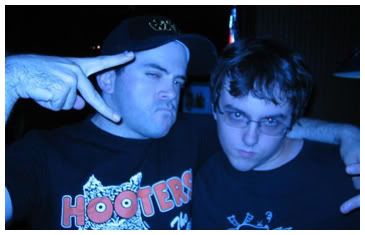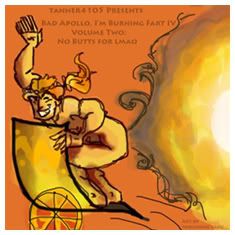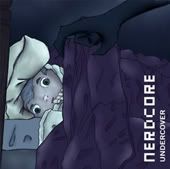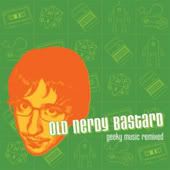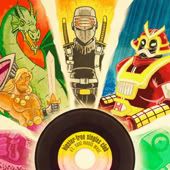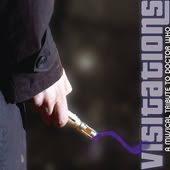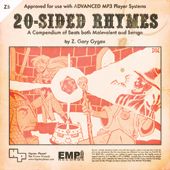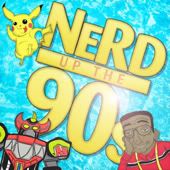I’m serious. It’s blogger law.
Last year around this time I enumerated our many triumphs as well as our missteps of 2006. Moreover, I challenged readers and artists not to focus too much on the uncertain future, but instead to concentrate on the now. I wrote – and it’s always odd when you have to quote yourself – "This is the golden age, and whether we rise or fall, we have this moment. Today we are all stars." I stand by that statement.
But we didn’t fizzle out in 2007. We grew bigger and brighter and we commanded just as much attention as the year prior. Nerdcore hip-hop (as well as many other delicious flavors of nerdy musical goodness) was seen on MTV, written about in Esquire, and even mentioned by the BBC.
mCRT put together the first successful nerdcore-centered festival with Nerdapalooza SE, Beefy became the first 2nd gen nerdcore artists to take the stage at PAX, and mc chris rejected, adopted, and then once again rejected the genre.
It was a big year, and, yes, once again we were stars. But that’s all. We were stars, but stars are very much islands in the sky.
While other nerdy scenes continued to coalesce into communities, nerdcore maintained its status quo as merely warring factions with fragile alliances.
A while back, I received the following communiqué from nerdcore artist Luzid outlining just that:
Yo, Z.My (abridged) response was as follows:
I wanted to ask your opinion on something that's been troubling me recently - the crumbling community that is nerdcore, versus the explosion of the wrock community.
Considering that the entirety of wrock could be absorbed into nerdcore due to its subject matter, it's odd that (at least in my view) the latter has a very thin fanbase and community, while the former seems to be growing in scope. It's particularly telling that wrock is not being held back by its limited vision (i.e. mostly being about Harry Potter), while nerdcore - for all its vast horizons (so many geeky topics) - doesn't feel like a cohesive community.
Your thoughts? Am I just seeing it differently due to not being into the wrock scene?
-Luzid
Interestingly enough, this is exactly the kind of thing I've been discussing with my two chief conspirators Matt and Church for some time now. Why is it that something as conceptually thin as Wrock manages to flourish while the promise of nerdcore remains mostly unfulfilled? No one can know for sure, but, after weeks (Hell, months!) of deliberation, I think I'm beginning to get down to some glimmer of truth. And I reckon it's pretty simple, now that I spell it out.So, while we are stars, we are not constellations. We are disparate yet related. We are similar yet disconnected. What we need, my friends, is lines.
In short, Wrockers - both fans and artists - seem to have a genuinely honest interest in community building.
Matt pointed this fact out really early on, but it wasn't until recently that I finally realized that this summation, as simple as it is, is what it all boils down to.
Unfortunately, that leads us to yet another question: why?
Why them and not us? Aren't we all just nerds expressing ourselves musically? Why do those of us on the nerdcore side seem to suffer from this odd disconnect that the Wrockers tend to be able to avoid?
This one's a lot deeper, but I think I have some ideas.
First and foremost, it seems to me that nerdcore fancies itself as being created in a vacuum. From the earliest, we've had artists creating in solitude. MC Frontalot, YTCracker, mc chris, MC Hawking: these cats got their start with very little outside input, with very little outside involvement. It wasn't until Rhyme Torrents (when High-C made a legitimate effort to build bridges) that anyone even considered pinning Front's ample label on all these obviously related artists.
Wrock, on the other hand, got its start with bands. Harry and the Potters, Draco and the Malfoys, et al are all natural artistic mini-communities in and of themselves. There was already this social aspect to what they were doing. By and large it wasn't one guy in front of a computer; it was a group of friends making music together.
But does that make them instantly more community-minded than nerdcore artists? Not necessarily.
So maybe it's the inherent personalities in question. mc chris is obviously more interested in mc chris as an individual than in mc chris as the de facto spokesperson of a musical community, and that's certainly understandable. Frontalot, though far more personable in this aspect than mc, is really more passive than one might anticipate with regard for nerdcore as a genre. He lets other folks use the term - gladly, I might add - but he has his own livelihood to worry about; this is also perfectly reasonable.
But do these examples speak to our root cause? Let's examine further.
On the other hand we have the bigger names in Wrock: the aforementioned HatP, The Remus Lupins, and The Whomping Willows, just to name a few.
These cats are really down there in the trenches. They seem to speak reverently of Wrock itself, like it's a force greater than the sum of the bands that everyone recognizes. For whatever magical (I made a funny!) reason, these guys see what they're doing as a community effort as opposed to a one-man, or one-act, show.
They are, in short, in it for the team. They - the big guys - are down for the movement.
But again we arrive at that dreaded word: why. What makes what they're doing so different?
Regarding this I also have a rough theory.
What we see from Wrock is, not to put too fine a point on it, an indie spirit. A punk rock spirit.
Maybe it simply has to do with what we do as much as who we are and how we do it. Rap is very often aggressive, confrontational. It thrives on beef and diss tracks. Rock, at least in regard to the truly independent kind, seems less absorbed with such trivialities. That's not to say there's not a fair measure of back-talk and animosity in independent rock circles, a fact to which Nursehella can surely attest, but maybe - just maybe - nerdcore simply inherited a megadose of the get-them-before-they-get-you spirit of hip-hop proper.
In the end, I think that each of these plays a part, but none truly answer the question at hand. Why nerdcore lacks the strength of community that's found in Wrock, or, for that matter, other rather nerdy styles like game rock, micromusic, or bastard pop, is a mystery, but it probably has roots in some combination of the personalities involved and maybe even the actual art created.
Or perhaps it's simpler still. Maybe Wrockers connect on the base level that is a love of the source material itself. Whereas nerdcore has DGs, CS gangstas, comic shop kings, hardcore gamers, and anime enthusiasts, Wrock simply has Wrockers: lovers of the preternatural world that JKR created.
Maybe what nerdcore lacks - or, more likely, simply tends to ignore – is true common ground.
And it wasn’t until I sat down to pin these words that I realized we had found them.
Back in October, news of artist T.Y.T.’s father’s illness began to make the rounds. T.Y.T. wasn’t looking for a handout; he was merely looking to use the skills and avenues he had at his disposal to raise some money to help his father get a liver. And the nerdcore community responded. Everyone from The Awful Show crew to a cavalcade of artists old and new stepped up. And when the topic of a benefit album was broached, no one was concerned about who was or was not nerdcore enough; folks just wanted to help.
On Christmas Eve, just days after receiving his transplant, T.Y.T.’s father passed. I don’t know much in the way of details, and even if I did I wouldn’t share them. A man’s grief is a very personal thing, and I’ll not pretend to understand what he is going through. But this event led to continued outpouring of emotion. Of support. A genuine sense of a community responding to the misfortune of one of its own.
T.Y.T.’s ordeal showed us unequivocally that we could be civil to one another, that we could be supportive and genuinely invested in our community both as artists and as individuals. The trick is remembering that lesson and applying it to our everyday interactions. That's not to say that we can't critique, that we can't, on occasion, clash; that's part of being a community too. It's just saying that maybe we should remember that we have an underlying commonality and use that as a basis for a little mutual respect.
2007 saw some amazing albums. It provided some fantastic gigs and birthed some phenomenal projects. But, in my mind, it will be remembered as the year we came together, if only for a minute and if only under the worst of circumstances.
So pick up a pen and draw some lines, people. They might not fix what’s wrong, but they may just see us through to another year.

 Still, many delightful occurrences did conspire to make this day a perfect storm of geeky goodness, and for that I must thank the many fine people who contributed.
Still, many delightful occurrences did conspire to make this day a perfect storm of geeky goodness, and for that I must thank the many fine people who contributed.

